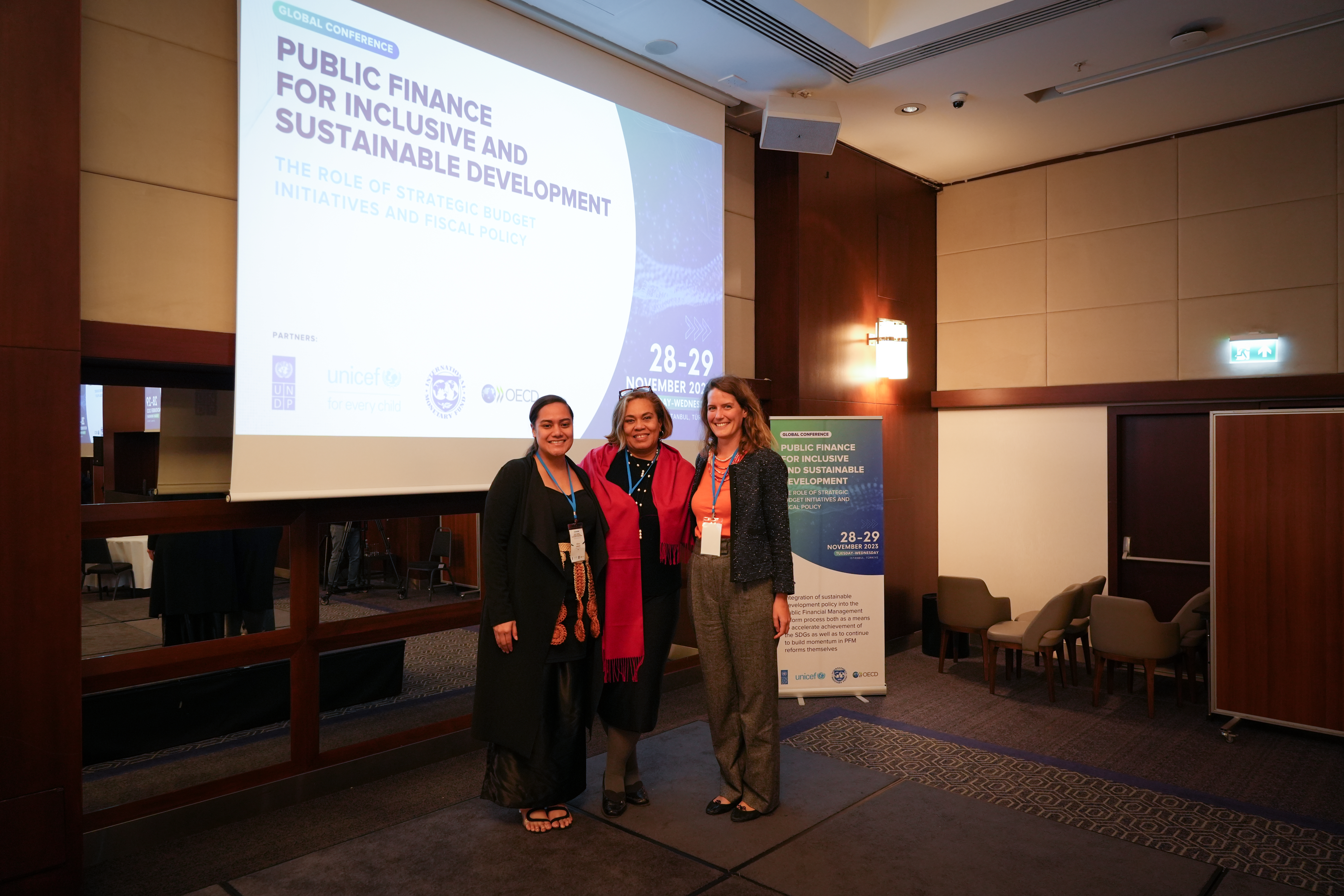Making Every $ Count at COP28: Insights from the Public Finance for Inclusive and Sustainable Development Global Conference
December 7, 2023

Vaka Pasifika Project Manager, Marine Destrez (right), with delegates from the Pacific.
Backing up our words with action is not a conceptual exercise, it’s a matter of survival for the Pacific. Representatives from Ministries of Finances from Fiji and Tonga reminded heads of budget and international financial institutions from around the world of their pressing priorities, as they converged for the Public Finance for Inclusive and Sustainable Development Global Conference on the 28 and 29 November in Istanbul ahead of COP28.
Navigating a sea of suits, the Blue Pacific delegation engaged with representatives from more than 40 countries. Diversity of opinion was the theme of the conference, with each attendee bringing a different answer to the question of how to align financial resources with political, people and planet priorities at the national and global level.
The Triple Focus ahead of COP28
With groundbreaking announcements of new funds at COP28, discussions around finance took center stage with a threefold focus. Firstly, there is an urgent need for increased financial resources to combat the challenges posed by climate change. Secondly, the time seems right to talk about optimizing the utilization of available funds, ensuring efficiency while placing people and the planet at the center of financial strategies. Lastly, calls to shift the burden of financing and reporting away from those already grappling with the immediate impacts of climate change should find answers.
Within the United Nations Development Programme (UNDP) Pacific Office, we have been working to make sense of these conversations - simultaneously winding our way across the Pacific via the launch of innovative financing instruments such as Blue Bonds, people centered public finance and risk-informed governance.
Beyond Tweaking the Status Quo
Conventional diagnostics and wisdom in public finance focus on improving existing fiscal and budget practices. Yet this week anyone reading between the lines of country experiences could hear a much more radical call for change. The call is not for mere adjustments, but for a fundamental reinvention of the system, aligning it with the ambitious goals we hopefully will set for ourselves and the planet. As we navigate the complexities of climate finance, there is a collective acknowledgment that our endeavors must be transformative, addressing the root cause rather than surface-level symptoms.
What shifts would be required for Public Finance to contribute to Sustainable Development and Sustainable Development to shape Public Finance?
Shift 1. Who gets to be an “expert” of public finance
Fiscal strategies can be intimidating, Public Finance Management feels sensitive, technical and well, boring, to many. Ministries of Finance and economists have often positioned themselves as the voice of reason, the arbitrators of political whims. While they might feel powerful, they’re often pushed to focus on cuts and limitations rather than transformative endeavors.
So, when the Head of Budget of Fiji set to review the budget process to see it better adapted to government priorities on gender equality, she recognized she doesn’t have all the answers and worked closely with the Ministry of Women. Similarly in Ireland, the Principal Officer of the Department of Expenditure and Reform noted the layers of data and information produced by its department resulted from relationship and hours of brainstorming with colleagues working on climate change policy, child welfare or gender empowerment.
Public finance experts might originally complain about not finding counterparts who “get finance” in other Ministries. Yet stepping out of their technical bubbles might be what may force finance experts on one side to shape a system adapted to sustainable goals, while on the other hand pushing policy experts to prioritize and cost their proposals.
Shift 2. How we envisage public finance
The emerging change in relationship and power dynamics between finance and sectors is a symptom of a larger tectonic shift. Public finance and fiscal strategies are slowly moving away from mere economic tools, where money is raised and spent to influence the economy. They are now increasingly seen as one of the instruments of sustainable development and public priorities. Spending money on health awareness campaigns, raising taxes on tobacco, creating a pollution free environment and enhancing human interactions are all sides of the same coin when it comes to cancer prevention, noted Natalia Pushkareva from the UNDP Tax for SDG Initiative.
Public monies and resources are at the center of fundamental questions for our societies: who contributes, how do we share, and importantly, what do we use it for? In Ghana, the Ministry of Finance is focusing on enabling a political and public conversations on these questions by partnering with the Ministry of Data to analyze the information produced throughout the budget cycle. In Spain, a digital platform tracking the links between public finance and sustainable development goals helps identify the government initiatives that contribute to more than one goal, and have a multiplier effect.
Radical change, finally, in the way we work
This sounds obvious enough, but our planet and societies are complex systems. Tracking the use and impact of money across 17 goals is just as complicated as negotiating what these 17 goals look like in every country around the world. In the Philippines, the National Economic Development Agency admitted that reconciling the demands for a tailored approach to each sector and political priority was challenging. In Cuba, the Minister of Finance recognized that the experience of other countries in Latin America had been fundamental in navigating similar challenges. The conference ended on a call for international partners to raise to this challenge and ensure coherence in their offer for technical assistance.
In the Pacific, we’ll continue to work closely with partners at the national, regional and international level to articulate a proposal that makes sense for each context – to rise up to the challenge and maximize every opportunity we have to make a difference and shape possible futures.

 Locations
Locations



